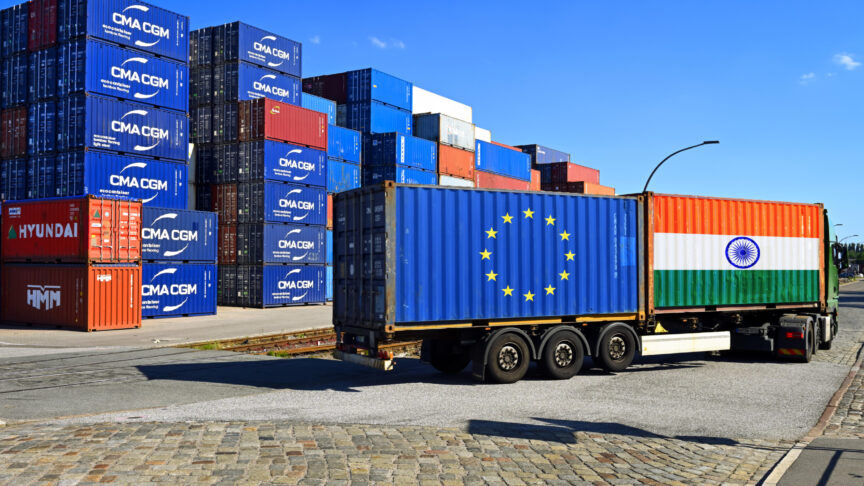Connectivity: A Hungarian globalisation strategy
To escape the middle-income trap in the next decade, Hungary needs an economic strategy of connectivity
Hungary has never been so close to catching up with the highly developed countries. To close the remaining gap, Hungary – a small, export-oriented country – needs an economic strategy that can overcome the challenges caused by global geopolitical changes and accelerate Hungarian economic growth at the same time.
The current fragmentation of the global order clutters Hungary’s path to development, but it also provides some opportunities. Hungary has belonged to Europe for a thousand years. As a member of the European Union and NATO, we see our future as part of the West. However, if the fragmented, bloc-based international order of the cold war era is restored, it will threaten Hungary’s international relations and trade status. Avoiding this outcome requires a strategy of connectivity.
The exhaustion of the neoliberal model
The current model of globalisation, established after the fall of the Soviet Union, is based on a unipolar world order led and often dominated by the United States and organised according to neoliberal principles. In essence, this model assumes that market participants can establish business relations with any part of the world spontaneously, at their own discretion, free of state control.
In this model, the lack of meaningful regulation and state control in economic matters has eliminated the security mechanisms capable of mitigating harmful effects. This weakness was dramatically exposed by the economic crisis of 2008: in the absence of a strong state, there was no actor capable of alleviating the rapid spread and drastic nature of the crisis or addressing its root causes. In addition, the neoliberal doctrine that focused on the importance of the service sector and profitability instead of industrial production, had left the established industrial capacity of many Western countries to wither over a decade or two. This strategy backfired in 2008, when Western powers, especially in Europe, were left without industry, and felt the effects of the crisis more keenly, while Asian countries – especially China – became stronger.
Events since 2008, including the migration crisis, Brexit, Donald Trump’s victory in the US presidential election, and the response to the global pandemic, have shown that the neoliberal order is faltering and increasingly losing its legitimacy. Russia’s war on Ukraine may be the final blow.
The West’s answer
In response to these crises, the West sought to preserve its declining global influence. Despite the positive effects that globalisation had on the development of non-Western powers, Western actors – who had pushed for globalisation a few decades ago – began to advocate for ‘decoupling’. In this process, the West – still led by the US – is attempting to solidify its leadership in its sphere of influence by isolating, weakening, and bringing under its control the states it can, re-establishing a system of blocs in the process that is painfully familiar to Hungary after its experience of the cold war.
In such a system, nearly all economic, political, and cultural transfers take place through each bloc’s leading states. This is bad news for the entire EU, which strives for strategic autonomy and the ability to make its own choices according to its own interests. And it is especially dangerous for the EU’s peripheral states because in such a system, the centre not only controls relations between blocs, but also takes the liberty of distributing resources within the bloc.
The Hungarian dilemma
Hungary has had a particularly bad experience with such blocs. Under Turkish occupation, Hungary often found itself a battleground in the struggle between the Christian and Islamic worlds. The Habsburg Empire later subordinated Hungary’s economic interests to those of its industrialised regions. Later still, the Soviet Union relegated Hungary to the periphery of the eastern bloc.
A bloc system forces Hungary into a subordinate role, making it harder for it to escape from the ranks of developing countries
The core problem is that in a bloc system, states must choose a centre, which then becomes their exclusive connection to other countries. A bloc system forces Hungary into a subordinate role, making it harder for it to escape from the ranks of developing countries. For example, in the current war and resulting economic sanctions, east-west trade routes – which have long been crucial to Hungary’s economic success – are blocked, limiting Hungary’s capacity for development.
To catch up, Hungary needs a globalisation model that can overcome the negative effects inherent to the bloc system. This model should focus on connectivity rather than decoupling; increased connections rather than a severing of ties.
Hungary’s connectivity model
Hungary has a realistic chance of escaping the middle-income trap in the 2020s and increasing its economic growth by maintaining the features of connectivity from the neoliberal order but countering its disadvantages through increased involvement of the state. This connectivity-based economic model offers an alternative to both the neoliberal world order and the model of globalisation based on international blocs. Its essence is that a country, in this case Hungary, should strive to maintain connections with as many other countries and market players from all over the world as possible. These connections should not be purely economic, but can also include trade, infrastructural ties, investment, and knowledge transfer, as well as public diplomacy.
Such a model eliminates the dangers of peripheralisation. States can build and control their relations with other actors without limitations from bloc leaders. Connectivity increases a country’s resilience; boosts the rate of return on investments and economic productivity in general; supports the creation of innovation clusters; and is especially suitable as a breakout strategy, since the growth in the number of contacts progressively increases the economic influence of the given country.
Hungary already has certain advantages in applying such a model. The country has effective state involvement in development, a tax system that encourages investment and entrepreneurship, growth of real wages over the last decade, and high value-added sectors. When it comes to capital inflows, besides encouraging foreign companies to establish their headquarters here, Hungary also seeks to strengthen domestic companies – including the oil and gas company MOL, OTP Bank, and the telecommunications company 4iG – so that they can become dominant players at the regional level.
This strategy provides the most value in horizontal sectors that pervade the economy, including banking, energy, and higher education, as well as strategic industries such as the military or infocommunications that can serve as breakout points, where Hungary needs to seek more foreign direct investment, which is already breaking records. In the field of energy, Hungary should build as many connections as possible, both with large global distribution points and within the immediate region. Overall, it should strengthen regional links, which are critical in a connectivity-based model. The economic and geographical unity of the Carpathian Basin makes it especially suitable in this regard. In addition, the government should seek to make the Hungarian banking sector, which is the catalyst for all other economic sectors, into a regional and global player. The transformation of higher education, which has already begun, will help promote knowledge transfer between different industrial actors and distant research centres.
On the industrial level, Hungary seeks to build up its military industry, encouraging the formation of defence clusters, and its information and communications sector, which has grown in recent decades. It also needs to strengthen the food, pharmaceutical, and automotive industries, which are excellent conduits for global connectivity.
Preserving interconnectivity within the West is central to this strategy. Western culture, Judeo-Christian values, and history lay the foundation for our shared civilisation, which is the key to its success. It is therefore paramount that we strengthen the cornerstones of Western civilisation – sovereignty, religion, and family – and counter destructive attempts to undermine our shared values and identity. To this end, the Hungarian government calls for the respect of national sovereignty, the effective protection of borders, and no tolerance of illegal migration. It funds the building and renovation of churches across the Carpathian Basin; and invests over 6 per cent of GDP in a unique pro-family policy to ease the burden on parents who would like to have more children. We believe that only through the protection of the values that constitute the backbone of our civilisation can we strengthen our connectivity within the West.
These components define Hungary’s ambitious strategy for escaping the middle-income trap and catching up with the highly developed countries in the next decade. The task is no small one, and the path to prosperity may be more difficult now than it has ever been. Yet we Hungarians believe that our country is destined for great things and that we are on the brink of a historic opportunity, the success of which depends on us alone.
Balázs Orbán is a member of the Hungarian parliament and political director for Prime Minister Viktor Orbán to whom he is unrelated.
The European Council on Foreign Relations does not take collective positions. ECFR publications only represent the views of their individual authors.



